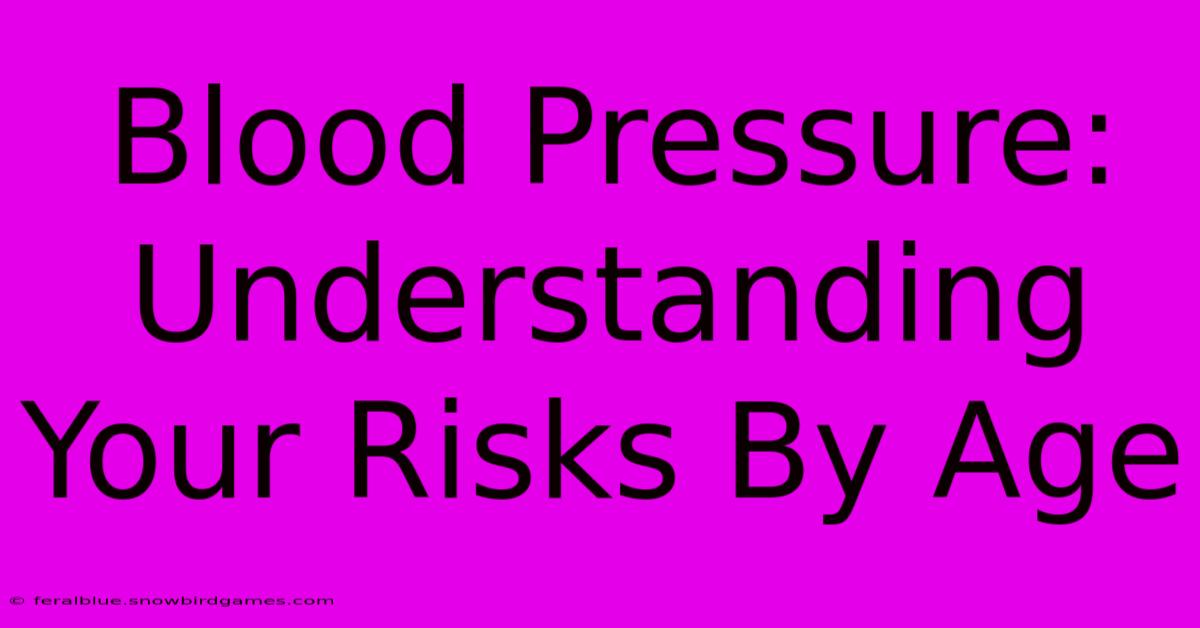Blood Pressure: Understanding Your Risks By Age

Table of Contents
Blood Pressure: Understanding Your Risks By Age
Maintaining healthy blood pressure is crucial for overall well-being, but the risks and recommended actions change throughout your lifespan. Understanding your blood pressure at different ages is key to proactive health management. This comprehensive guide will explore blood pressure risks by age group, helping you take control of your cardiovascular health.
Blood Pressure Basics: A Quick Refresher
Before delving into age-specific risks, let's clarify what blood pressure is and why it matters. Blood pressure is the force of your blood pushing against the walls of your arteries. It's measured in millimeters of mercury (mmHg) and represented as two numbers: systolic (top number) and diastolic (bottom number). High blood pressure, or hypertension, increases your risk of serious health problems like heart disease, stroke, and kidney failure.
Understanding the Numbers:
- Normal Blood Pressure: Less than 120/80 mmHg
- Elevated Blood Pressure: 120-129/less than 80 mmHg
- Stage 1 Hypertension: 130-139/80-89 mmHg
- Stage 2 Hypertension: 140/90 mmHg or higher
- Hypertensive Crisis: Higher than 180/120 mmHg (requires immediate medical attention)
Blood Pressure Risks: A Breakdown by Age
Blood pressure risks and management strategies vary significantly across different life stages. Let's examine the key considerations for each age group:
Childhood and Adolescence (0-18 years):
While hypertension is less common in children and teens, it's not unheard of. Risk factors include obesity, family history of hypertension, and unhealthy lifestyle choices (poor diet, lack of physical activity). Regular checkups are crucial to detect any early signs. Prevention focuses on healthy habits like balanced nutrition, regular exercise, and limiting screen time.
Young Adulthood (19-39 years):
This age group often faces hidden risks, as hypertension can develop silently. Lifestyle factors like stress, poor diet (high sodium intake, processed foods), lack of exercise, and excessive alcohol consumption contribute significantly. Regular blood pressure checks are essential, especially if there's a family history of hypertension.
Middle Age (40-64 years):
Middle age marks a significant increase in hypertension risk. Risk factors accumulate, including weight gain, menopause (for women), and the potential for developing underlying conditions like diabetes. Regular monitoring and proactive lifestyle changes become crucial for prevention and management.
Older Adulthood (65+ years):
Hypertension becomes increasingly prevalent in older adults. Physiological changes associated with aging increase vulnerability. Existing conditions like heart disease and kidney disease further elevate the risk. Regular monitoring and medication, when necessary, are vital to manage blood pressure and prevent complications.
Managing Your Blood Pressure: Key Strategies
Regardless of age, effective blood pressure management involves a holistic approach:
- Dietary Changes: Reduce sodium intake, increase potassium-rich foods (fruits, vegetables), and choose a heart-healthy diet emphasizing whole grains, lean protein, and healthy fats.
- Regular Exercise: Aim for at least 150 minutes of moderate-intensity aerobic activity per week.
- Stress Management: Practice relaxation techniques like yoga, meditation, or deep breathing exercises.
- Weight Management: Maintaining a healthy weight reduces strain on the cardiovascular system.
- Limit Alcohol Consumption: Excessive alcohol intake can raise blood pressure.
- Quit Smoking: Smoking significantly increases hypertension risk.
- Medication: If lifestyle changes aren't enough, your doctor may prescribe medication to control your blood pressure.
When to See a Doctor
Regular blood pressure checks are crucial, especially if you have risk factors. Consult your doctor immediately if you experience symptoms such as severe headaches, dizziness, shortness of breath, or nosebleeds.
Disclaimer: This article provides general information and should not be considered medical advice. Always consult with your doctor or other qualified healthcare provider for any questions you may have regarding a medical condition. They can assess your individual risk factors and recommend the appropriate course of action. Regular checkups and open communication with your healthcare provider are essential for managing blood pressure throughout your life.

Thank you for visiting our website wich cover about Blood Pressure: Understanding Your Risks By Age. We hope the information provided has been useful to you. Feel free to contact us if you have any questions or need further assistance. See you next time and dont miss to bookmark.
Featured Posts
-
The True Age Of Rachin Ravindra Finally Revealed
Apr 06, 2025
-
The Secrets To Rupert Grints Financial Success
Apr 06, 2025
-
Fixits Net Worth Their Philanthropic Endeavors
Apr 06, 2025
-
Give Mom The Best Birthday Ever A Touching Message
Apr 06, 2025
-
Endricks Wifes Age Is It Relevant
Apr 06, 2025
